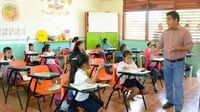On Monday, May 5, 2025, students across Mexico will enjoy a day off from school as the nation commemorates the historic Battle of Puebla. This significant event, which marks the victory of the Mexican army over French forces in 1862, is recognized annually, although it is not classified as a mandatory holiday under the Federal Labor Law.
According to the official calendar from the Secretaría de Educación Pública (SEP), there will be no classes in public schools of basic education, which includes preschool, primary, and secondary levels. The decision aligns with the SEP's established holidays for the 2024-2025 school year, which also includes days off on May 1, May 15, and May 30.
The Battle of Puebla is a pivotal moment in Mexican history, symbolizing national pride and resilience. Under the leadership of General Ignacio Zaragoza, the Mexican forces achieved a remarkable victory against a better-equipped French army, which has since become a point of reference for Mexican identity and resistance.
While students will be enjoying their day off, the same does not apply to the general workforce. The 5th of May is not a legally mandated holiday, meaning that businesses and offices will operate as usual unless they choose to observe the day internally. This distinction often leads to confusion among those who expect a nationwide break.
In addition to the day off, students in various regions, including Quintana Roo and Yucatán, have recently returned from a short break following the Labor Day holiday on May 1. The Yucatán region, specifically, has been enjoying a series of extended weekends, which have allowed families to spend quality time together, engage in outdoor activities, or plan short trips.
The SEP has confirmed that the upcoming Teacher's Day on May 15 will also be a non-school day, further extending the break for students. Educational authorities across the country are keen to ensure that students remain engaged and informed during these breaks, offering suggestions for family activities such as going to the beach, organizing picnics, or visiting local attractions.
Teachers in Quintana Roo are actively engaging with parents to develop plans that will help compensate for the 51 days of missed classes due to recent strikes and negotiations with the government. With ongoing discussions and planned protests, the education sector is navigating a challenging landscape, balancing the need for educational continuity with the rights of educators.
As the 2024-2025 school year approaches its conclusion, educational institutions are preparing for the end of the term, which is set for July 16, 2025. Following this, summer vacations will commence, lasting until August 25, when the new school year is scheduled to begin.
The recent wave of strikes and protests among teachers has highlighted the ongoing struggles within the education system, as educators seek better conditions and support from the government. The next significant demonstration is planned for May 15, coinciding with Teacher's Day, where teachers nationwide are expected to participate.
In Quintana Roo, the local teachers' committee has emphasized that their fight for improved working conditions and educational resources is far from over. They continue to advocate for their rights while striving to ensure that students receive the education they deserve.
As families plan their activities for this long weekend, the 5th of May offers an opportunity to reflect on the historical significance of the day while enjoying leisure time together. Suggested activities include visiting local cenotes, enjoying a day at the beach, or taking a ride on the Tren Maya, which connects various municipalities and showcases the beauty of the region.
In conclusion, while students will relish their break on May 5, 2025, the complexities surrounding education in Mexico remain at the forefront of national discussions. The balance between honoring historical events and addressing current educational challenges continues to shape the landscape for both students and educators.





